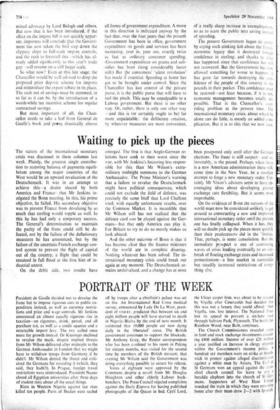Waiting to pick up the pieces
The nature of the international monetary crisis was discussed in these columns last week. Plainly, the greatest single contribu- tion to restoring balance of payments equili- brium among the major countries of the West would be an upward revaluation of the Deutschemark. It was in an attempt to achieve this—a desire shared by both America and France—that Mr Jenkins in- stigated the Bonn meeting. In this, his prime objective, he failed. His secondary objective was to prevent France from devaluing by so much that sterling would topple as well. In this he has had only a temporary success. The General's determination to maintain the parity of the franc could still be de- feated, not by the failure of the deflationary measures he has announced, but by the failure of the uncertain French exchange con- trol system to prevent the flight of capital out of the country, a flight that could be resumed in full flood at the first hint of in- dustrial unrest.
On the debit side, two results have emerged. The first is that Anglo-German re- lations have sunk to their worst since the war, with Mr Jenkins's hectoring less respon- sible for this than Mr Wilson's extra- ordinary midnight summons to the German Ambassador. The Prime Minister's warning that a failure to revalue the Deutschemark might have political consequences, which could not exclude the held of defence, was precisely the same bluff that Lord Chalfont tried, with equally unfortunate results, over the Common Market. It is incredible that Mr Wilson still has not realised that the defence card can be played against the Ger- mans—but that only America can play it. For Britain to try to do so merely makes us look absurd.
And the other outcome of Bonn is that it has become clear that the finance ministers of the world are in complete disarray. Nothing whatever has been solved. The in- ternational monetary crisis could break out again at any moment. The Deutschemark re- mains undervalued, and a change has at most been postponed only until after the German elections. The franc is still suspect -- and so. inevitably, is the pound. Perhaps when there is a new American administration there will, some time in the New Year, be a resolute attempt to forge a new monetary order. Cer- tainly Mr Nixon's advisers seem to have en- couraging ideas about developing greater exchange rate flexibility. But it seems most improbable.
On the evidence of Bonn the nations of the world must now be considered unlikely to get around to constructing a new and improved international monetary order until the present one has finally collapsed. When it has, they will no doubt pick up the pieces more quickly than their predecessors did in the 'thirties. That, perhaps, is some consolation. But the immediate prospect is one of continuing waves of crisis leading eventually to an out- break of floating exchange rates and increased protectionism—a free market in currencies but, steadily increased restrictions of c‘er■- thing else.






































 Previous page
Previous page